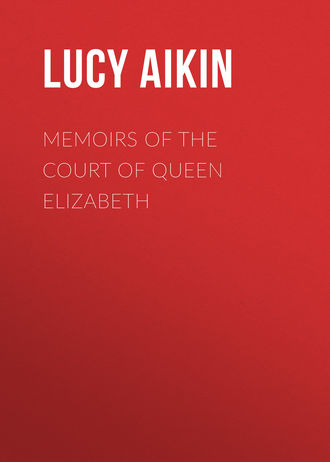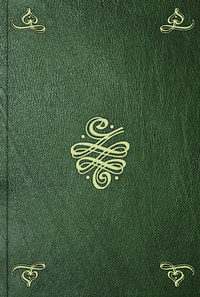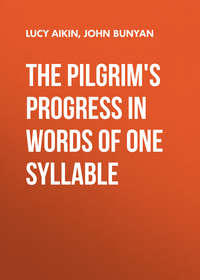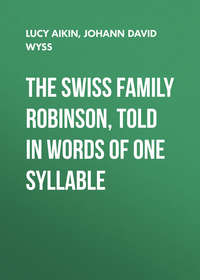 полная версия
полная версияMemoirs of the Court of Queen Elizabeth
The sagacious and upright statesman was soon satisfied where the blame ought to rest, and he suggested a plan for the government of the country which excluded the idea of Leicester's return. But the intrigues of the favorite finally prevailed, and he was authorized in June 1587 to resume a station of which he had proved himself equally incapable and unworthy, having previously been further gratified by her majesty with the office of lord high-steward, and with permission to resign that of master of the horse to his stepson the earl of Essex. But fortune disdained to smile upon his arms; and his failure in an attempt to raise the siege of Sluys produced such an exasperation of his former quarrel with the States, that in the month of November the queen found herself compelled to supersede him, appointing the brave lord Willoughby captain-general in his place.
On his return to England, Leicester found lord Buckhurst preparing against him a charge of malversation in Holland, and he received a summons to justify himself before the privy-council; but he better consulted his safety by flying for protection to the footstool of the throne. The queen, touched by his expressions of humility and sorrow, and his earnest entreaties "that she would not receive with disgrace on his return, him whom she had sent forth with honor, nor bring down alive to the grave one whom her former goodness had raised from the dust," consented once again to receive him into wonted favor. Nor was this all; for on the day when he was expected to give in his answer before the council, he appeared in his place, and by a triumphant appeal to her majesty, whose secret orders limited, as he asserted, his public commission, baffled at once the hopes of his enemies and the claims of public justice. What was still more gross, he was suffered to succeed in procuring a censure to be passed upon lord Buckhurst, who continued in disgrace for the nine remaining months of Leicester's life, during which a royal command restrained him within his house. Elizabeth must in this instance have known her own injustice even while she was committing it; but by the loyal and chivalrous nobility, who knelt before the footstool of the maiden-queen, "her buffets and rewards were ta'en with equal thanks;" and Abbot, the chaplain of lord Buckhurst, has recorded of his patron, that "so obsequious was he to this command, that in all the time he never would endure, openly or secretly, by day or night, to see either wife or child." He had his reward; for no sooner was the queen restored to liberty by the death of her imperious favorite, than she released her kinsman, honored him with the garter, procured, two years after, his election to the chancellorship of the university of Oxford, and finally appointed him Burleigh's successor in the honorable and lucrative post of lord treasurer.
During the unavoidable delay which the expedition of Drake had brought to the designs of Philip II., the prince of Parma had by his master's directions been endeavouring to amuse the vigilance of Elizabeth with overtures of negotiation. The queen, at the request of the prince, sent plenipotentiaries to treat with him in Flanders; and though the Hollanders absolutely refused to enter into the treaty, they proceeded with apparent earnestness in the task of settling preliminaries. Some writers maintain, that there was, from the beginning, as little sincerity on one side as on the other; to gain time for the preparations of attack or defence, being the sole object of both parties in these manœuvres. Yet the cautious and pacific character of the policy of Elizabeth, and the secret dread which she ever entertained of a serious contest with the power of Spain, seem to render it more probable that the wish and hope of an accommodation was at first on her side real; and that the fears of the States that their interests might become the sacrifice, must have been by no means destitute of foundation. Leicester is said to have had the merit of first opening the eyes of his sovereign to the fraudulent conduct of the prince of Parma,—who in fact was furnished with no powers to treat,—and to have earned for himself by this discovery the restoration of her favor.
In March 1588 these conferences broke off abruptly. It was impossible for either party longer to deceive or to act the being deceived; for all Europe now rang with the mighty preparations of king Philip for the conquest of England;—preparations which occupied the whole of his vast though disjointed empire, from the Flemish provinces which still owned his yoke, to the distant ports of Sicily and Naples.
The spirit of the English people rose with the emergency. All ranks and orders vied with each other in an eager devotedness to the sacred cause of national independence; the rich poured forth their treasures with unsparing hand; the chivalrous and young rushed on-board ships of their own equipment, a band of generous volunteers; the poor demanded arms to exterminate every invader who should set foot on English ground; while the clergy animated their audience against the Pope and the Spaniard, and invoked a blessing on the holy warfare of their fellow-citizens. Elizabeth, casting aside all her weaknesses, showed herself worthy to be the queen and heroine of such a people. Her prudence, her vigilance, her presence of mind, which failed not for a moment, inspired unbounded confidence, while her cheerful countenance and spirited demeanour breathed hope and courage and alacrity into the coldest bosoms. Never did a sovereign enter upon a great and awful contest with a more strenuous resolution to fulfil all duties, to confront all perils; never did a people repay with such ardor of gratitude, such enthusiasm of attachment, the noblest virtues of a prince.
The best troops of the country were at this time absent in Flanders; and there was no standing army except the queen's guard and the garrisons kept in a few forts on the coast or the Scottish border. The royal navy was extremely small, and the revenues of the crown totally inadequate to the effort of raising it to any thing approaching a parity with the fleets of Spain. The queen possessed not a single ally on the continent capable of affording her aid; she doubted the fidelity of the king of Scots to her interests, and a formidable mass of disaffection was believed to subsist among her own subjects of the catholic communion. It was on the spontaneous efforts of individuals that the whole safety of the country at this momentous crisis was left dependent: if these failed, England was lost;—but in such a cause, at such a juncture, they could not fail; and the first appeal made by government to the patriotism of the people was answered with that spirit in which a nation is invincible. A message was sent by the privy-council to inquire of the corporation of London what the city would be willing to undertake for the public service? The corporation requested to be informed what the council might judge requisite in such a case. Fifteen ships and five thousand men, was the answer. Two days after, the city "humbly intreated the council, in sign of their perfect love and loyalty, to prince and country, to accept ten thousand men and thirty ships amply furnished." "And," adds the chronicler, "even as London, London like, gave precedent, the whole kingdom kept true rank and equipage." At this time, the able-bodied men in the capital between the ages of eighteen and sixty amounted to no more than 17,083.
Without entering into further detail respecting the particular contributions of different towns or districts to the common defence, it is sufficient to remark, that every sinew was strained, and that little was left to the charge of government but the task of arranging and applying the abundant succours furnished by the zeal of the country. One trait of the times, however, it is essential to commemorate. Terror is perhaps the most merciless of all sentiments, and that which is least restrained either by shame or a sense of justice; and under this debasing influence some of the queen's advisers did not hesitate to suggest, that in a crisis so desperate, she ought to consult her own safety and that of the country, by seeking pretexts to take away the lives of some of the leading catholics. They cited in support of this atrocious proposal the example of Henry VIII. her father, who, before his departure for the French wars, had without scruple brought to the block his own cousin the marquis of Exeter and several others, whose chief crime was their attachment to the ancient faith and their enjoying a degree of popularity which might enable them to raise commotions in his absence.
Elizabeth rejected with horror these suggestions of cowardice and cruelty, at the same time that she omitted no measures of precaution which she regarded as justifiable. The existing laws against priests and seminary-men were enforced with vigilance and severity, all popish recusants were placed under close inspection, and a considerable number of those accounted most formidable were placed under safe custody in Wisbeach-castle.
To these gentlemen, however, the queen caused it to be intimated, that the step which she had taken was principally designed for their protection, since it was greatly to be apprehended that, in the event of landing of the Spaniards, the Roman catholics might become the victims of some ebullition of popular fury which it would not then be in the power of government to repress.
This lenient proceeding on the part of her majesty was productive of the best effects; the catholics who remained at liberty became earnest to prove themselves possessed of that spirit of patriotism and loyalty for which she had given them credit. Some entered the ranks as volunteers; others armed and encouraged their tenantry and dependants for the defence of their country; several even fitted out vessels at their own expense, and intrusted the command of them to protestant officers on whom the government could entirely rely.
After the defeat of the Armada, the prisoners at Wisbeach-castle, having signed the submission required by law of such as had offended in hearing mass and absenting themselves from church, petitioned the privy-council for their liberty; but a bond for good behaviour being further demanded of them, with the condition of being obedient to such orders as six members of the privy-council should write down respecting them, they refused to comply with such terms of enlargement, and remained in custody. As the submission which they had tendered voluntarily was in terms apparently no less strong than the bond which they refused, it was conjectured that the former piece had been drawn up by their ghostly fathers with some private equivocation or mental reservation; a suspicion which receives strong confirmation from the characters and subsequent conduct of some of these persons,—the most noted fanatics certainly of their party,—and amongst whom we read the names of Talbot, Catesby, and Tresham, afterwards principal conspirators in the detestable gunpowder plot98.
The ships equipped by the nobility and gentry to combat the armada amounted in the whole to forty-three, and it was on-board these vessels that young men of the noblest blood and highest hopes now made their first essay in arms. In this number may be distinguished George Clifford third earl of Cumberland, one of the most remarkable, if not the greatest, characters of the reign of Elizabeth.
The illustrious race of Clifford takes origin from William duke of Normandy; in a later age its blood was mingled with that of the Plantagenets by the intermarriage of the seventh lord de Clifford and a daughter of the celebrated Hotspur by Elizabeth his wife, whose father was Edward Mortimer earl of March. Notwithstanding this alliance with the house of York, two successive lords de Clifford were slain in the civil wars fighting strenuously on the Lancastrian side. It was to the younger of these, whose sanguinary spirit gained him the surname of the Butcher, that the barbarous murder of the young earl of Rutland was popularly imputed; and a well-founded dread of the vengeance of the Yorkists caused his widow to conceal his son and heir under the lowly disguise of a shepherd-boy, in which condition he grew up among the fells of Westmorland totally illiterate, and probably unsuspicious of his origin.
At the end of five-and-twenty years, the restoration of the line of Lancaster in the person of Henry VII. restored to lord de Clifford the name, rank, and large possessions of his ancestors; but the peasant-noble preferred through life that rustic obscurity in which his character had been formed and his habits fixed, to the splendors of a court or the turmoils of ambition. He kept aloof from the capital; and it was only on the field of Flodden, to which he led in person his hardy tenantry, that this de Clifford exhibited some sparks of the warlike fire inherent in his race.
His successor, by qualities very different from the homely virtues which had obtained for his father among his tenantry and neighbours the surname of the Good, recommended himself to the special favor of Henry VIII., who created him earl of Cumberland, and matched his heir to his own niece lady Eleanor Brandon. The sole fruit of this illustrious alliance, which involved the earl in an almost ruinous course of expense, was a daughter, who afterwards became the mother of Ferdinando earl of Derby, a nobleman whose mysterious and untimely fate remains to be hereafter related. By a second and better-assorted marriage, the earl of Cumberland became the father of George, his successor, our present subject, who proved the most remarkable of this distinguished family. The death of his father during his childhood had brought him under wardship to the queen; and by her command he was sent to pursue his studies at Peterhouse, Cambridge, under Whitgift, afterwards primate. Here he applied himself with ardor to the mathematics, and it was apparently the bent of his genius towards these studies which first caused him to turn his attention to nautical matters. An enterprising spirit and a turn for all the fashionable profusions of the day, which speedily plunged him in pecuniary embarrassments, added incitements to his activity in these pursuits; and in 1586 he fitted out three ships and a pinnace to cruise against the Spaniards and plunder their settlements. It appears extraordinary that he did not assume in person the command of his little squadron; but combats and triumphs perhaps still more glorious in his estimation awaited him on the smoother element of the court.
In the games of chivalry he bore off the prize of courage and dexterity from all his peers; the romantic band of knights-tilters boasted of him as one of its brightest ornaments, and her majesty deigned to encourage his devotedness to her glory by an envied pledge of favor.
As he stood or kneeled before her, she dropped her glove, perhaps not undesignedly, and on his picking it up, graciously desired him to keep it. He caused the trophy to be encircled with diamonds, and ever after at all tilts and tourneys bore it conspicuously placed in front of his high-crowned hat.
But the emergencies of the year 1588 summoned him to resign the fopperies of an antiquated knight-errantry for serious warfare and the exercise of genuine valor. Taking upon him the command of a ship, he joined the fleet appointed to hang upon the motions of the Spanish armada and harass it in its progress up the British Channel; and on several occasions, especially in the last action, off Calais, he signalized himself by uncommon exertions.
In reward of his services, her majesty granted him her royal commission to pursue a voyage to the South Sea, which he had already projected; she even lent him for the occasion one of her own ships; and thus encouraged, he commenced that long series of naval enterprises which has given him an enduring name. After two or three voyages he constantly declined her majesty's gracious offers of the loan of her ships, because they were accompanied with the express condition that he should never lay any vessel of hers on-board a Spanish one, lest both should be destroyed by fire. Such was the character of mingled penuriousness and timidity which pervaded the maritime policy of this great princess, even after the defeat of the armada had demonstrated that, ship for ship, her navy might defy the world!
At this period, all attempts against the power and prosperity of Spain were naturally regarded with high favor and admiration; and it cannot be denied that in his long and hazardous expeditions the earl of Cumberland evinced high courage, undaunted enterprise, and an extraordinary share of perseverance under repeated failures, disappointments, and hardships of every kind. It is also true that his vigorous attacks embarrassed extremely the intercourse of Spain with her colonies; and, besides the direct injury which they inflicted, compelled this power to incur an immense additional expense for the protection of her treasure-ships and settlements. But the benefit to England was comparatively trifling; and to the earl himself, notwithstanding occasional captures of great value, his voyages were far from producing any lasting advantage; they scarcely repaid on the whole the cost of equipment; while the influx of sudden wealth with which they sometimes gratified him, only ministered food to that magnificent profusion in which he finally squandered both his acquisitions and his patrimony. None of the liberal and enlightened views which had prompted the efforts of the great navigators of this and a preceding age appear to have had any share in the enterprises of the earl of Cumberland. Even the thirst of martial glory seems in him to have been subordinate to the love of gain, and that appetite for rapine to which his loose and extravagant habits had given the force of a passion.
He had formed, early in life, an attachment to the beautiful daughter of that worthy character and rare exemplar of old English hospitality, sir William Holles, ancestor to the earls of Clare of that surname; but her father, from a singular pride of independence, refused to listen to his proposals, saying "that he would not have to stand cap in hand to his son-in-law; his daughter should marry a good gentleman with whom he might have society and friendship."
Disappointed thus of the object of his affections, he matched himself with a daughter of the earl of Bedford; a woman of merit, as it appears, but whom their mutual indifference precluded from exerting over him any salutary influence. As a husband, he proved both unfaithful and cruel; and separating himself after a few years from his countess, on pretence of incompatibility of tempers, he suffered her to pine not only in desertion, but in poverty. We shall hereafter have occasion to view this celebrated earl in the idly-solemn personage of queen's champion; meantime, he must be dismissed with no more of applause than may be challenged by a character signally deficient in the guiding and restraining virtues, and endowed with such a share only of the more active ones as served to render it conspicuous and glittering rather than truly and permanently illustrious.
Henry earl of Northumberland likewise joined the fleet, on-board a vessel hired by himself. Immediately after the fatal catastrophe of his father in 1585, this young nobleman, anxious apparently to efface the stigma of popery and disaffection stamped by the rash attempts of his uncle and father on the gallant name of Percy, had seized the opportunity of embarking with Leicester for the wars of the Low Countries. He now sought distinction on another element, and in a cause still nearer to the hearts of Englishmen. The conversion to protestantism and loyalty of the head of such a house could not but be regarded by Elizabeth with feelings of peculiar complacency, and in 1593 she was pleased to confer upon the earl the insignia of the garter. He was present in 1601 at the siege of Ostend, where he considered himself as so much aggrieved by the conduct of sir Francis Vere, that on the return of this officer to England he sent him a challenge. During the decline of the queen's health, Northumberland was distinguished by the warmth with which he embraced the interests of the king of Scots, and he was the first privy-councillor named by James on his accession to the English throne. But the fate of his family seemed still to pursue him: on some unsupported charges connected with the gunpowder plot, he was stripped of all his offices, heavily fined, and sentenced to perpetual imprisonment: the tardy mercy of the king procured however his release at the end of fifteen years, and he spent the remnant of his life in tranquil and honorable retirement. This unfortunate nobleman was a man of parts: the abundant leisure for intellectual pursuits afforded by his long captivity was chiefly employed by him in the study of the mathematics, including perhaps the occult sciences; and as he was permitted to enjoy freely the conversation of such men of learning as he wished to assemble around him, he became one of their most bountiful patrons.
Thomas Cecil, eldest son of the lord-treasurer, formerly a volunteer in the expedition to Scotland undertaken in favor of the regent Murray, and more recently appointed governor of the Brill in consideration of his services in the war in Flanders, also embarked to repel the invaders; as did Robert his half-brother, the afterwards celebrated secretary of state created earl of Salisbury by James I.
Robert Cecil was deformed in his person, of a feeble and sickly constitution, and entirely devoted to the study of politics; and nothing, it is to be presumed, but his steady determination of omitting no means of attracting to himself that royal favor which he contemplated as the instrument by which to work out his future fortunes, could have engaged him in a service so repugnant to his habits and pursuits, and for which the hand of nature herself had so evidently disabled him.
The earl of Oxford, in expiation perhaps of some of those violences of temper and irregularities of conduct by which he was perpetually offending the queen and obstructing his own advancement in the state, equipped on this occasion a vessel which he commanded.
Sir Charles Blount, notwithstanding the narrowness of his present fortunes, judged it incumbent on him to give a similar proof of attachment to his queen and country; and the circumstance affords an occasion of introducing to the notice of the reader one of the brightest ornaments of the court of Elizabeth.
This distinguished gentleman, now in the twenty-fifth year of his age, was the second son of James sixth lord Montjoy of the ancient Norman name of Le Blonde, corruptly written Blount. The family history might serve as a commentary on the reigning follies of the English court during two or three generations. His grandfather, a splendid courtier, consumed his resources on the ostentatious equipage with which he attended to the French wars his master Henry VIII. with whom he had the misfortune to be a favorite. His father squandered a diminished patrimony still more absurdly in his search after the philosopher's stone; and the ruin of the family was so consummated by the ill-timed prodigalities of his elder brother, that when his death without children in 1594 transmitted the title of lord Montjoy to sir Charles, a thousand marks was the whole amount of the inheritance by which this honor was to be maintained. It is needless to add that the younger brother's portion with which he set out in life was next to nothing. Having thus his own way to make, he immediately after completing his education at Oxford entered himself of the Inner Temple, as meaning to pursue the profession of the law: but fortune had ordained his destiny otherwise; and being led by his curiosity to visit the court, he there found "a pretty strange kind of admission," which cannot be related with more vivacity than in the original words of Naunton. "He was then much about twenty years of age, of a brown hair, a sweet face, a most neat composure, and tall in his person. The queen was then at Whitehall, and at dinner, whither he came to see the fashion of the court. The queen had soon found him out, and with a kind of an affected frown asked the lady carver who he was? She answered, she knew him not; insomuch that enquiry was made from one to another who he might be, till at length it was told the queen that he was brother to the lord William Mountjoy. This inquisition, with the eye of majesty fixed upon him, (as she was wont to do to daunt men she knew not,) stirred the blood of this young gentleman, insomuch as his colour went and came; which the queen observing called him unto her, and gave him her hand to kiss, encouraging him with gracious words and new looks; and so diverting her speech to the lords and ladies, she said, that she no sooner observed him but that she knew there was in him some noble blood, with some other expressions of pity towards his house. And then again, demanding his name, she said, 'Fail you not to come to the court, and I will bethink myself how to do you good.' And this was his inlet, and the beginning of his grace." It does not appear what boon the queen immediately bestowed upon her new courtier; but he deserted the profession of the law, sat in the parliaments of 1585 and 1586 as the representative of two different Cornish boroughs, received in the latter year the honor of knighthood, and soon after his present expedition appeared considerable enough at court to provoke the hostility of the earl of Essex himself. Raleigh, now high in favor, and invested with the offices of captain of the queen's guard and her lieutenant for Cornwall, had been actively engaged since the last year in training to arms the militia of that county. He had also been employed, as a member of the council of war, in concerting the general plan of national defence: but his ardent and adventurous valor prompted him to aid his country in her hour of trial on both elements, and with hand as well as head: throwing himself therefore into a vessel of his own which waited his orders, he hastened to share in the discomfiture of her insulting foe.





